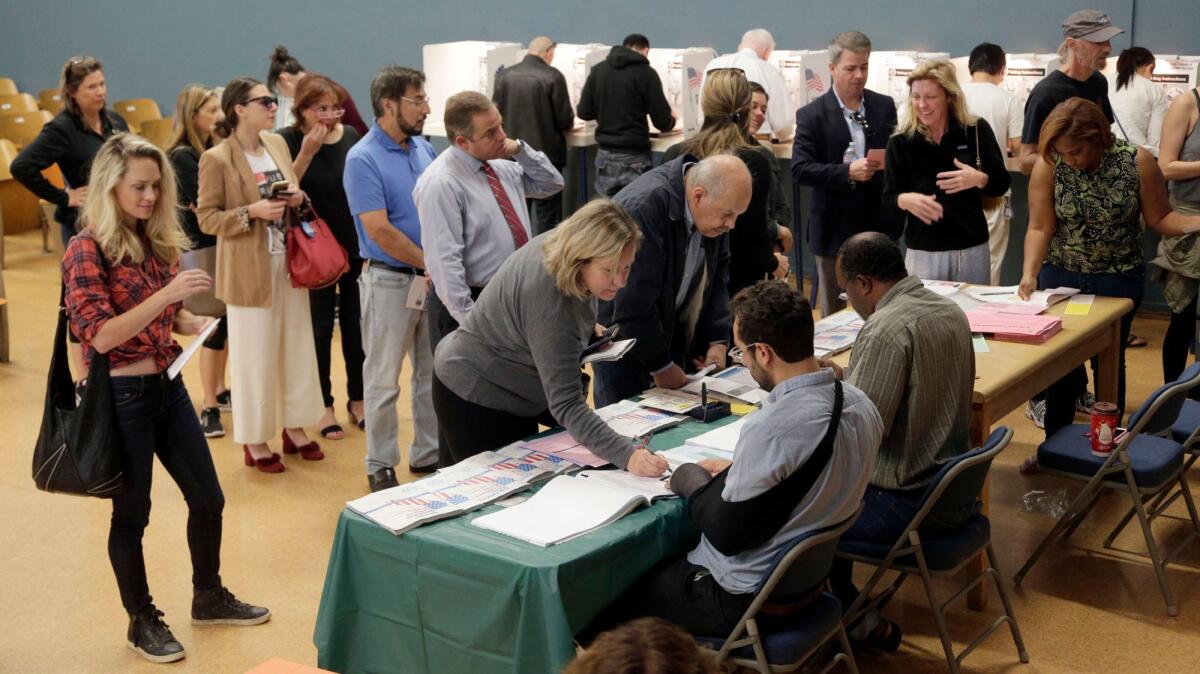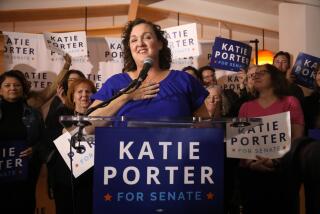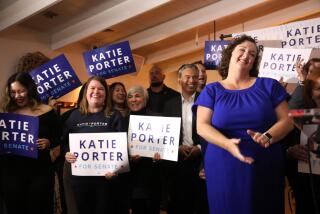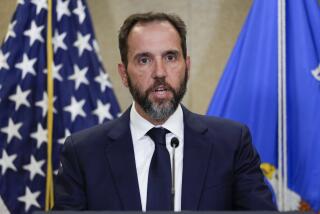Editorial: There are plenty of things to object to about the election. It being ‘rigged’ isn’t one of them

Americans are accustomed to accepting the outcome of even the closest and hardest-fought presidential elections — even those, such as the 2000 race that put George W. Bush in the White House, in which the winner of the electoral vote didn’t prevail in the popular vote.
Yet three weeks after the final ballots were cast in the 2016 election, the notion that the contest was “rigged” or otherwise lacking in legitimacy is alarmingly widespread. A YouGov poll conducted from Nov. 11-14 found that 22% of respondents thought the election was rigged. Among Democrats the number was 42%.
So pronounced is the disquiet that some usually serious commentators are spinning scenarios about reversing Donald J. Trump’s victory through recounts or a revolt by members of the Electoral College. That seems highly unlikely. Even the Clinton campaign noted that it “had not uncovered any actionable evidence of hacking or outside attempts to alter the voting technology.” As for the Electoral College, there is no indication that a substantial number of electors will rebel and support Clinton.
Nevertheless, the unease is real. And whatever one thinks of the outcome of the election — and this page endorsed Hillary Clinton and repeatedly described Trump as unfit — a perception that the election was unfair is corrosive.
[The Electoral College] is an anti-democratic anachronism that should be abolished... But its existence isn’t proof that the election was ‘rigged.’
To some extent, the popularity of the “rigged” theory reflects widespread disaffection with Trump, whose often offensive campaign rhetoric has inspired protests of “Not My President.” But it also feeds on real and perceived interference with the election — by Russian hackers, by the director of the FBI and by Republican officials who made it harder for Democratic-leaning citizens to vote — and on fear-mongering about imaginary voter fraud.
Ironically, the chief culprit in propagating the myth of that sort of “rigging” is Trump himself. During the campaign he sowed doubt about the integrity of the election process, and even after his victory he has been peddling utterly unsubstantiated claims about “millions” of illegally cast votes (in an effort to explain away his second-place finish in the popular vote). On Sunday the president-elect tweeted: “Serious voter fraud in Virginia, New Hampshire and California — so why isn’t the media reporting on this? Serious bias — big problem!” The actual big problem, as California secretary of state Alex Padilla noted, was that Trump’s allegations were unsubstantiated and absurd.
That’s not to say that there aren’t real issues and problems contributing to public disaffection that need to be acknowledged and addressed. The Electoral College, for instance, is an anti-democratic anachronism that should be abolished through a constitutional amendment. But its existence isn’t proof that the election was “rigged”; if Clinton had won an electoral-vote majority and finished second in the popular vote, her supporters would happily have congratulated her.
The hacking of Clinton campaign chairman John Podesta’s emails and those of the Democratic National Committee — by Russian state actors, according to some U.S. intelligence officials — suggests that a foreign government might have utilized technology to embarrass one candidate in a U.S. election and boost the candidate it preferred. That sort of interference is outrageous and ought to concern American officials regardless of their party.
While it’s impossible to prove that it cost Clinton the election, FBI Director James Comey’s announcement on Oct. 28 that he was reopening the investigation into her use of a private email server — and his follow-up two days before the election reaffirming he would not seek charges against her — revived an issue that the Democratic candidate thought she had put behind her.
Comey’s action violated the fundamental principle that the Justice Department doesn’t take unnecessary action close to Election Day that might affect the outcome. In the future, he — or his successors — must refrain from such intervention in the political process.
Finally, there is at least some evidence that certain Republican legislatures made it harder for Democratic-leaning voters to cast their ballots and might have cost Clinton votes. The top election official in Milwaukee, for instance, said that a Wisconsin law requiring photo ID for voters probably contributed to declines in turnout in poor areas of that city.
Laws and policies that depress the vote are objectionable and ought to be reversed. But they aren’t proof that the election was “rigged” in the sense that votes were fixed or fraudulent or intentionally tampered with. The distinction matters — even if the election has produced a president who has trouble making distinctions.
Follow the Opinion section on Twitter @latimesopinion and Facebook
More to Read
A cure for the common opinion
Get thought-provoking perspectives with our weekly newsletter.
You may occasionally receive promotional content from the Los Angeles Times.






